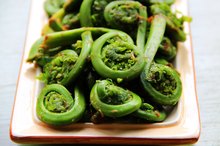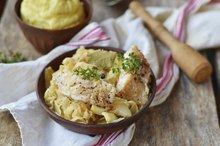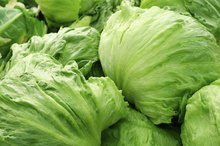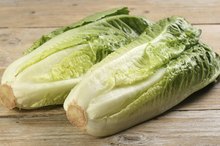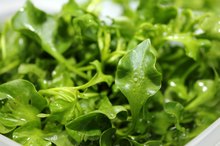Rainbow Chard Nutritional Value
Rainbow chard is the common name used to describe chard that has a variety of bright yellow, red, orange and purple stalks in each bunch. With an identical taste and similar nutrition to the more common green-stemmed chard often called Swiss chard, rainbow chard can be eaten raw in salads, braised or added to soups, stews or gratins. Store fresh rainbow chard in the refrigerator and use it within four days.
Virtually Fat-Free
A 1-cup serving of cooked rainbow chard contains 35 calories. Only about 1.3 of these calories -- just 3.7 percent of the total caloric content in a serving -- are contributed by the vegetable's 0.14 grams of fat. Cooked rainbow chard has a trace amount of saturated fat -- approximately 0.02 grams per serving -- and contains no cholesterol. It also has a small amount of heart-healthy poly- and monounsaturated fats.
Excellent Source of Dietary Fiber
Fiddlehead Ferns Nutrition
Learn More
Rainbow chard has 7.23 grams of carbohydrates per cooked cup. Of this amount, 3.7 grams are dietary fiber. Consuming a cooked cup of rainbow chard supplies 19- to 30-year-old men with almost 11 percent of their daily fiber requirements, 31- to 50-year-old men with 12 percent of their needs and men over 51 with 13 percent of their recommended daily allowance. Women 19 to 30 years old would receive 13 percent of their RDA from a serving of rainbow chard, whereas women between 31 and 50 would get 15 percent of theirs. Older women would receive 17 percent of their RDA. Simple sugars contribute about 1.9 grams of carbohydrates to rainbow chard's total per serving.
Outstanding Way to Get Vitamins A and K
The recommended daily allowance of vitamin A is 900 micrograms for a man and 700 micrograms for a woman. With 536 micrograms of vitamin A in every cooked cup, a serving of chard can supply about 60 percent of a man's RDA and 76 percent of a woman's. Rainbow chard is even richer in vitamin K: Each 1-cup serving has 573 micrograms of vitamin K, over 100 percent of the required daily intake of the vitamin for both men and women. Vitamin C and vitamin E are also present in high concentrations in rainbow chard.
Packed With Iron
Choline Rich Vegetables
Learn More
Each 1-cup serving of cooked rainbow chard contains approximately 4 grams of iron, or 22 percent of the recommended daily allowance for women and 50 percent of the requirement per day for men. You can increase the amount of iron you absorb from rainbow chard by combining it with a rich source of vitamin C. Try stirring sliced rainbow chard into vegetable soups containing carrots and tomatoes or topping a salad containing chard leaves with orange segments. Magnesium, manganese and copper are other minerals that rainbow chard provides in high concentrations.
Full of Phytochemicals
A 2009 study published in "Food, Agriculture and Environment" reported that chard is a rich source of polyphenols, antioxidant compounds that may help lower your risk of heart disease, cancer, diabetes, osteoporosis and degenerative neurological conditions such as Alzheimer's disease. To get the highest amount of polyphenols, don't discard rainbow chard's bright stems when you're preparing the vegetable. A 2013 study found that the most deeply colored parts of green leafy vegetables like chard have the highest polyphenol and antioxidant activity.
Related Articles
References
- Food Network: Off the Beaten Aisle - Rainbow Chard
- Real Simple: Chard
- University of Maryland Medical Center: Vitamin A (Retinol)
- University of Maryland Medical Center: Vitamin K
- University of Maryland Medical Center: Iron
- The American Journal of Clinical Nutrition: Polyphenols - Antioxidants and Beyond
- International Journal of Agriculture and Food Science Technology: Antioxidant and Nutritional Activity Studies of Green Leafy Vegetables
Writer Bio
Michelle Kerns writes for a variety of print and online publications and specializes in literature and science topics. She has served as a book columnist since 2008 and is a member of the National Book Critics Circle. Kerns studied English literature and neurology at UC Davis.
